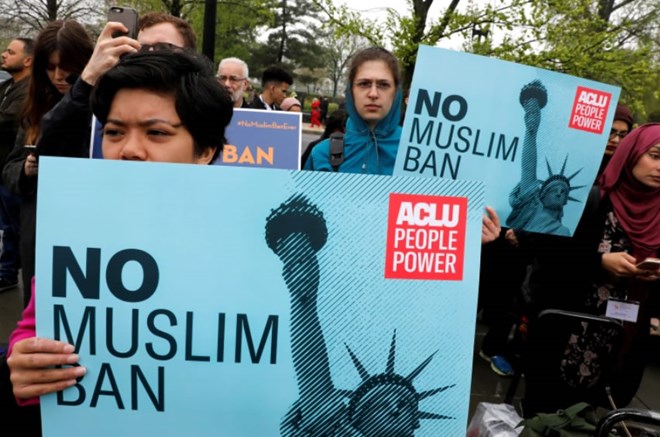The US House of Representatives has passed a bill that would limit the ability of any United States president to impose a travel ban on the basis of religion, a move that was welcomed by civil rights advocates as “a major step forward”.
The legislation, known informally as the NO BAN Act, comes in response to former President Donald Trump’s controversial “Muslim ban” that barred travel to the US from several Muslim-majority countries.
The bill, which must also pass in the US Senate to become law, was approved by a 218-208 vote in the House on Wednesday.
“The Muslim ban tore families apart, put lives on hold for years and labelled Muslims, Africans and other targeted people as threatening outsiders,” said Madihha Ahussain, counsel to Muslim Advocates, a US civil rights group.
“We must ensure that no president can enact discriminatory bans like this ever again and with the passage of the NO BAN Act in the House, we are taking a major step forward to ensuring that they won’t,” Ahussain said in a statement as the bill was passed.
The bill, which must also pass in the US Senate to become law, was approved by a 218-208 vote in the House on Wednesday.
“The Muslim ban tore families apart, put lives on hold for years and labelled Muslims, Africans and other targeted people as threatening outsiders,” said Madihha Ahussain, counsel to Muslim Advocates, a US civil rights group.
“We must ensure that no president can enact discriminatory bans like this ever again and with the passage of the NO BAN Act in the House, we are taking a major step forward to ensuring that they won’t,” Ahussain said in a statement as the bill was passed.
President Joe Biden reversed Trump’s travel ban by executive order on January 20, his first day in office.
Trump issued the ban shortly after taking office in 2017, drawing widespread protests and condemnation.
It was struck down twice by US courts before it was recast as a national security measure and ultimately upheld in 2018 by the US Supreme Court.
The ban initially applied to most people attempting to travel to the US from Syria, Iran, Yemen, Somalia, and Libya, as well as from North Korea and Venezuela. In 2020, Trump expanded it to include Myanmar, Eritrea, Kyrgyzstan, Nigeria, Sudan and Tanzania.
Criticised as discriminatory and punitive, it had immediate and far-reaching consequences for Muslim Americans and their families, refugees and others left stranded in third countries.
It divided families, denied people access to healthcare, and prevented friends and relatives from attending weddings, funerals and graduations.
“The Muslim and African Bans abused executive power to discriminate against and harm countless people based solely on their national origin or religion,” Marielena Hincapié, executive director of the National Immigration Law Center, said in a statement on Wednesday.
“The NO BAN Act will make sure that no president can weaponize this dangerously overbroad power again,” Hincapié said.
The NO BAN Act would revise US immigration law to prohibit discrimination on the basis of religion and would limit the ability of presidents to issue executive orders imposing any such future travel restrictions.
Even though Trump was defeated in the 2020 presidential election and Biden reversed the travel ban, US legislators said it was important to take legislative action.
“Donald Trump’s Muslim ban is a dark stain on our country’s history, and it must never happen again,” said Democratic Representative Don Beyer, a sponsor of the bill.
“It is very important to make clear to the American people and to the world that this betrayal of our national values, which hurt so many people, is not what we stand for and will not be repeated,” Beyer said when the bill was introduced.
It is unclear what prospects the Democratic-backed House bill will have in the US Senate, where Democrats hold only a slim majority.
Chris Coons, a close political ally of Biden, is leading the effort to advance the legislation in the chamber.
@Aljazera





